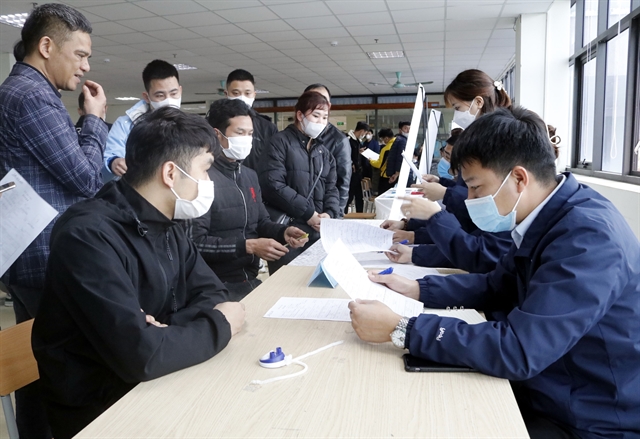 Society
Society

 |
| Workers search for opportunities at a job fair. — VNA/VNS Photo Đồng Thúy |
HÀ NỘI — Trần Văn Khải lost his job four months ago and he still has not found a new one.
Khải, from Sóc Sơn District in Hà Nội, came to the Hà Nội Employment Service Centre (HESC) to search for an opportunity.
"I want to find a job related to welding and although I've had interviews with several companies, I haven't found anything suitable,” said Khải.
Some companies insist staff work overtime, which isn't suitable for people of a certain age.
“I’m nearly 50 years old, my working endurance is not as good as before, so it is difficult to meet their needs,” he said.
Other companies have better working conditions but they are far from Khải’s house.
“If I consider travel costs and rent, it will be very expensive,” he said, adding that it was too difficult for him to change occupation, because he did not have any other professional knowledge and experience.
Nguyễn Thị Sương, from Thạch Thất District, also went to the HESC to look for a seasonal job because she could not find anything stable.
Sương is over 40 years old and has difficulty finding work because she cannot compete with younger workers when enterprises’ requirements are often very high.
When Sương went to the HESC to complete procedures for unemployment benefits, it was suggested she learn a new skill, but she was quite apprehensive.
She worries that if she learns a new major, it will take a certain time period. During that time, she cannot work part-time to have income, which puts much financial pressure on her family.
"That's why I chose to find a temporary seasonal job before finding one more permanent," Sương said.
Vũ Quang Thành, deputy director of the HESC, told the VOV e-newspaper that losing a job was one of the biggest risks for workers.
"As a unit directly involved in resolving unemployment insurance and job referrals, we have listened to a lot of opinions," said Thành.
"Losing a job changes the lives of families, causing them to constantly face crises. It is also related to social order and social insurance withdrawal. Job loss entails many consequences that no worker wants."
Many workers who came to apply for the unemployment insurance revealed that the reason for quitting their jobs was mainly due to low wages.
Thành added: "For low-skilled workers, we have advised them so they can access further vocational training, equip them with appropriate professional skills.
"We do not let the unemployment period last long, making workers feel self-conscious. The HESC always tries to help workers quickly return to the labour market."
However, Thành said, feedback from a number of companies showed that lots of workers do not focus on training themselves in soft skills, qualifications and improving their working attitude.
Meanwhile, in the context of international integration and the fourth industrial revolution, these things become even more important.
Many workers have weak foreign language skills, so even though they have good professional skills, they still cannot connect with new jobs.
During the connection process at trading sessions, due to the short time, workers’ knowledge and skills may not be fully evaluated. But during the probationary period, the employees will reveal it clearly.
Therefore, workers need to train themselves in soft skills, working style, awareness, attitude, foreign languages and information technology to be ready to access jobs.
Regarding training for workers, Thành emphasised that it was necessary to improve qualifications and expand further training, not just at the elementary level.
Training requires support from businesses.
Lê Đình Quảng, deputy head of the Legal Policy Department under the Việt Nam General Confederation of Labour, said that the labour market required workers to have certain skills and expertise.
When the market requires, employers and employees must change and improve their defects.
Employers also need to have general criteria for employees when entering the enterprises.
Businesses should define specific skills so that workers can clearly understand them.
Currently, Việt Nam’s laws clearly stipulate the training responsibilities of employers.
Specially, workers themselves must be more aware of the market mechanism and the risks of losing their jobs, thereby becoming flexible and adaptive in the new working environment.
To do so, said Quảng, workers must be equipped with enough professional skills.
When they lose job, they must pay attention to new vocational training suitable to their conditions to find a new, sustainable job, not just focus on unemployment benefits.
According to the Ministry of Labour, Invalids and Social Affairs, in the first half of this year, the labour market continued to face many difficulties, affecting more than half a million workers, including job loss, reduced working hours, and labour contract suspension.
Notably, those job losses and reductions mainly fall in textiles and garments, footwear, electronic component production and wood processing with old workers. — VNS




